牛津译林版(2019)必修 第二册 Unit3 Festivals and customs Grammar and usage课件(21张ppt)
文档属性
| 名称 | 牛津译林版(2019)必修 第二册 Unit3 Festivals and customs Grammar and usage课件(21张ppt) | 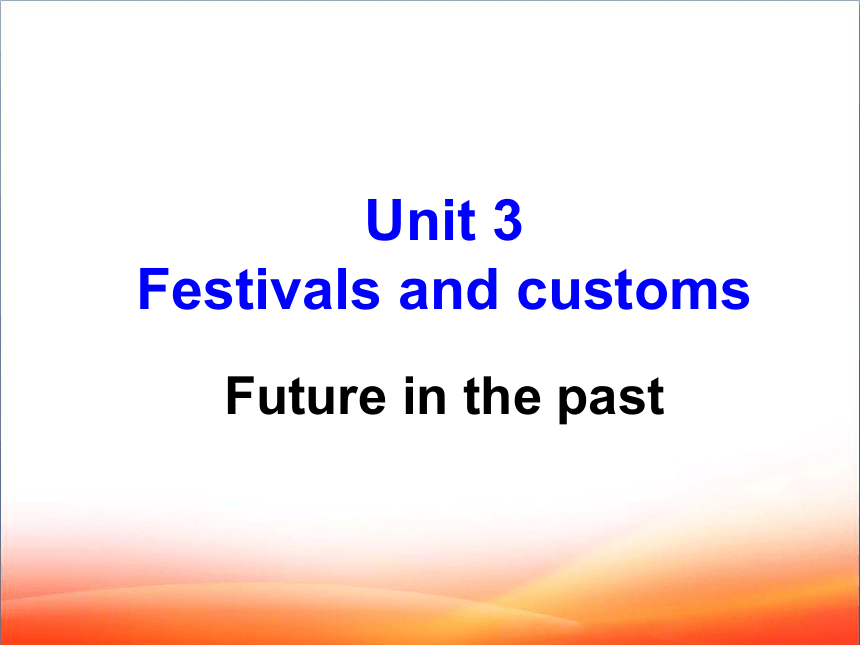 | |
| 格式 | pptx | ||
| 文件大小 | 600.1KB | ||
| 资源类型 | 教案 | ||
| 版本资源 | 牛津译林版(2019) | ||
| 科目 | 英语 | ||
| 更新时间 | 2022-04-30 09:23:18 | ||
图片预览

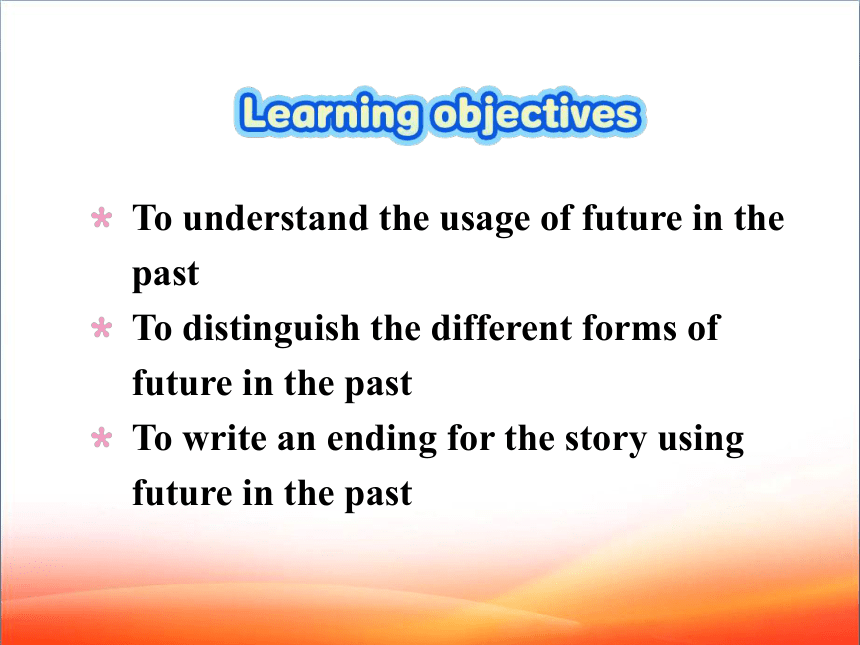
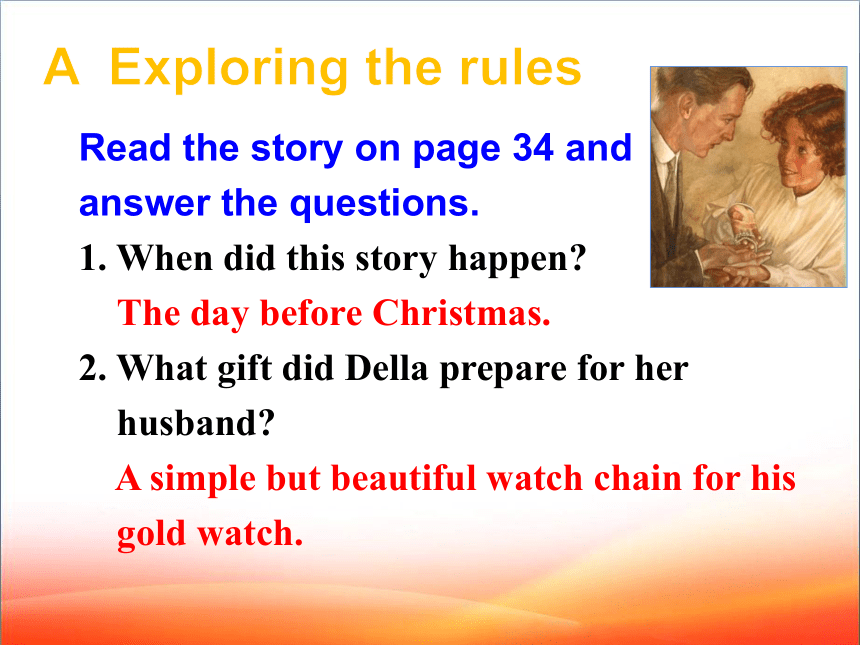
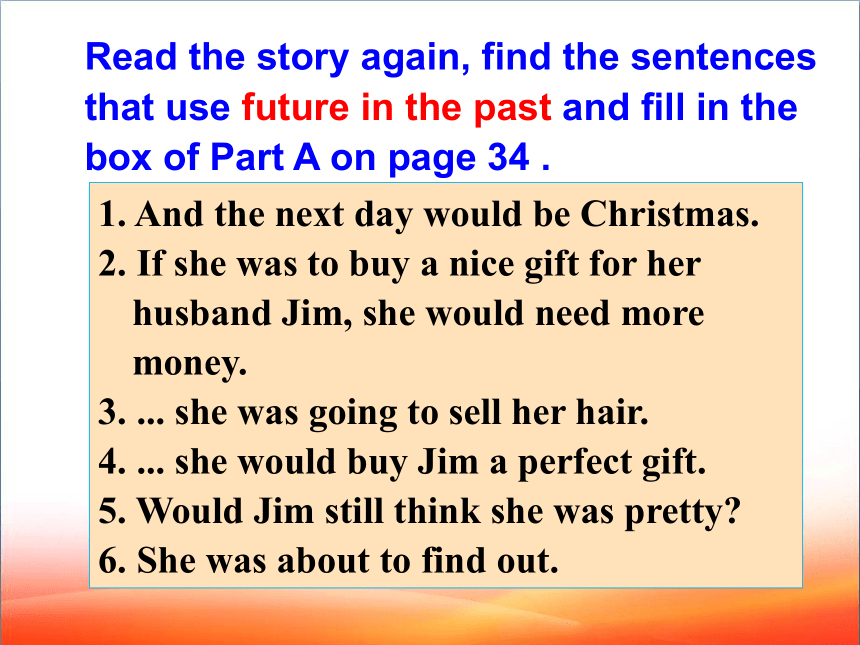
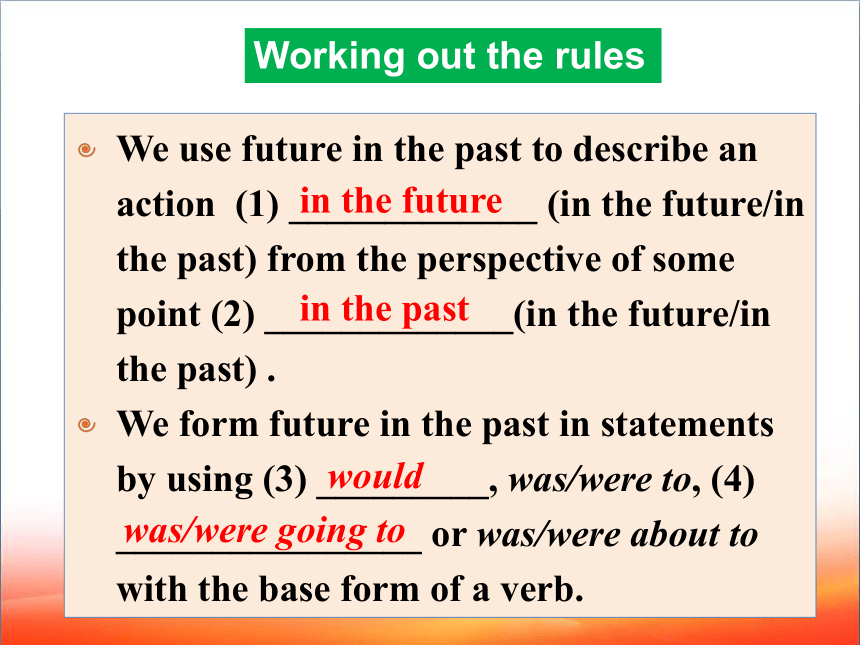
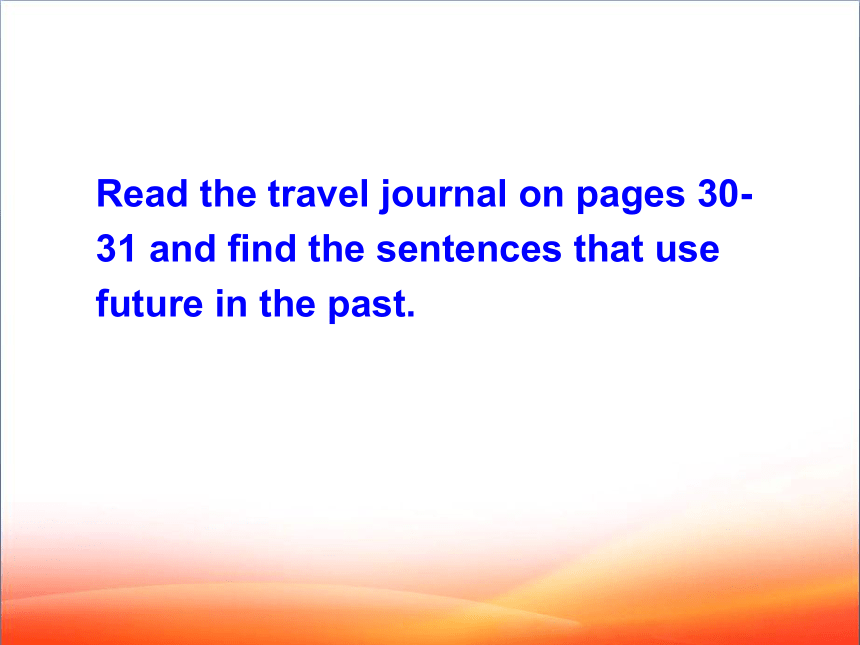
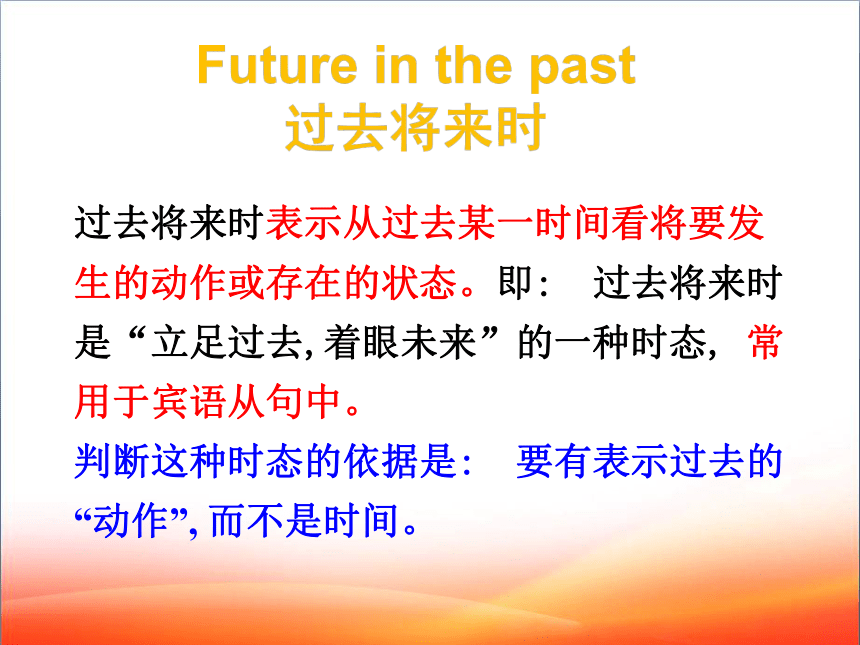
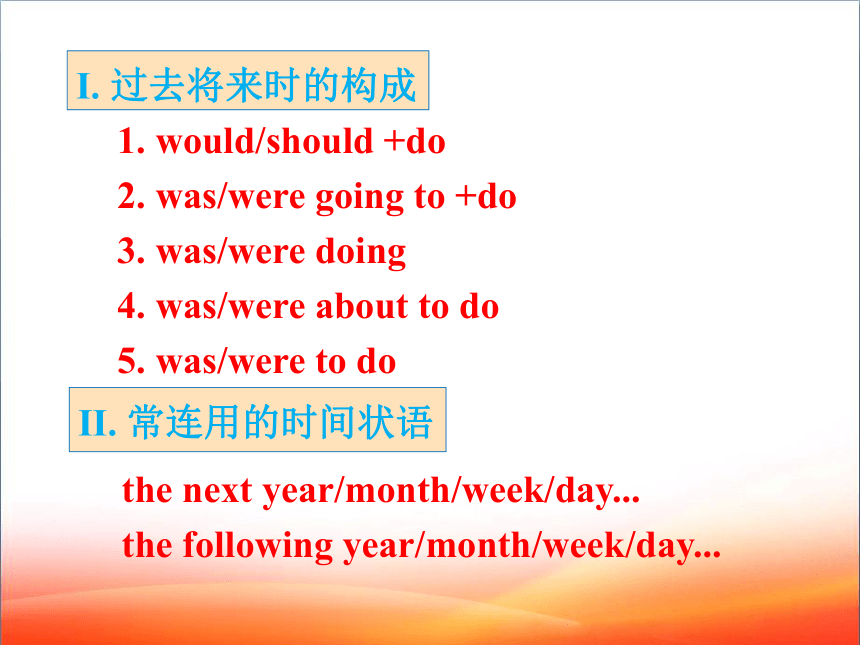
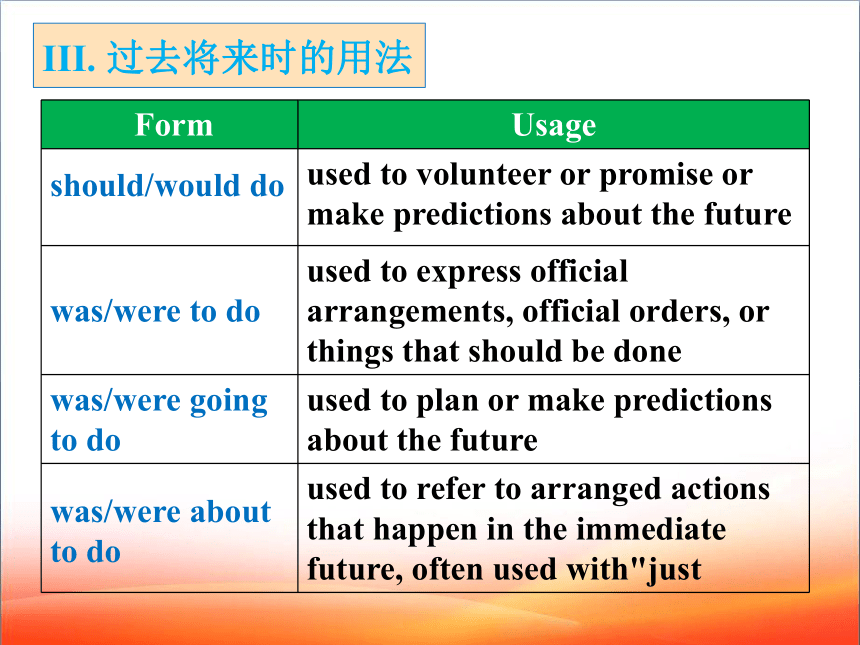
文档简介
(共21张PPT)
Unit 3
Festivals and customs
Future in the past
To understand the usage of future in the past
To distinguish the different forms of future in the past
To write an ending for the story using future in the past
Read the story on page 34 and
answer the questions.
1. When did this story happen
The day before Christmas.
2. What gift did Della prepare for her
husband
A simple but beautiful watch chain for his
gold watch.
A Exploring the rules
Read the story again, find the sentences that use future in the past and fill in the box of Part A on page 34 .
1. And the next day would be Christmas.
2. If she was to buy a nice gift for her husband Jim, she would need more money.
3. ... she was going to sell her hair.
4. ... she would buy Jim a perfect gift.
5. Would Jim still think she was pretty
6. She was about to find out.
We use future in the past to describe an action (1) _____________ (in the future/in the past) from the perspective of some point (2) _____________(in the future/in the past) .
We form future in the past in statements by using (3) _________, was/were to, (4) ________________ or was/were about to with the base form of a verb.
Working out the rules
in the future
in the past
would
was/were going to
Read the travel journal on pages 30-31 and find the sentences that use future in the past.
Future in the past
过去将来时
过去将来时表示从过去某一时间看将要发生的动作或存在的状态。即: 过去将来时是“立足过去,着眼未来”的一种时态, 常用于宾语从句中。
判断这种时态的依据是: 要有表示过去的
“动作”, 而不是时间。
1. would/should +do
2. was/were going to +do
3. was/were doing
4. was/were about to do
5. was/were to do
II. 常连用的时间状语
the next year/month/week/day...
the following year/month/week/day...
I. 过去将来时的构成
III. 过去将来时的用法
Form Usage
should/would do used to volunteer or promise or make predictions about the future
was/were to do used to express official arrangements, official orders, or things that should be done
was/were going to do used to plan or make predictions about the future
was/were about to do used to refer to arranged actions that happen in the immediate future, often used with"just
e.g.
1. The poor woman believed that her son would come back sooner or later.
2. I thought it was going to rain soon.
3. She was to arrive at the station before
3:00 pm, but she got there too late.
4. The thief was about to leave when the
police arrived.
IV. 过去将来时典型错误例析
1. 我们不知道他是否要在会上发言。
误: We didn’t know whether he is going to speak at the meeting.
正: We didn’t know whether he was going
to speak at the meeting.
解析: 该句主句为过去时, 且宾语从句表示
从过去某个时间看将要发生的动作,
所以从句要用过去将来时态。
2. 老师问汤姆长大后准备干什么。
误: The teacher asked Tom what he was
going to be when he would grow up.
正: The teacher asked Tom what he was
going to be when he grew up.
分析: 在时间状语从句中, 常用一般过去
时表示在过去看将要发生的动作。
3. 他们说如果下星期天不下雨他们就去农场。
误: They said that they were going to the
farm if it would not rain the next
Sunday.
正: They said that they were going to the
farm if it didn’t rain the next Sunday.
分析: 在条件状语从句中, 常用一般过去时
表示在过去看来将要发生的动作。
4. 王林打电话告诉她妈妈, 她要买一些书。
误: Wang Lin rang up to tell her mother
that she should buy some books.
正: Wang Lin rang up to tell her mother
that she would buy some books.
分析: 过去将来时可以由“助动词should/
would+动词原形”构成, 但should一
般只用于第一人称。
1. Paul: I (a) __________ (visited/was about to visit)the museum with my friends last weekend. What about you
Emily: I(b) ______________ (saw/was going to see)a documentary film about the Spring Festival with Joanna on Saturday, but she didn't feel well. So I just stayed at home.
visited
was going to see
B Applying the rules
B1
Complete the conversations with the correct expressions in the brackets.
2. Alex: We(a) _________________ (are going to hand in/were going to hand in) our report on festivals around the world next Monday.
Colin: Yes, but I(b) _______________ (wasn't to start/haven't started) it yet.
Alex: You told me you(c) ________________ (would work on/worked on) it all day yesterday.
Colin: Oh, I (d) ________________ (was about
to start/would start) when my cousin
(e) __________(would come/came) over.
are going to hand in
haven't started
would work on
was about to start
came
Jim was shopping for a gift for his wife Della. The next day (1)__________ Christmas. With an income of twenty dollars per week, life was hard for the couple, but Jim wanted to buy a perfect gift for Della. He thought of the beautiful set of combs on show in one of the shop windows on Broadway.
Below is a story about Jim's gift for plete the story with the correct verbs in the box below, using future in the past. Some verbs can be used more than once.
make think be sell
would be
B2
Della had wanted those combs for so long. Tomorrow, Jim decided, he (2)____________
________________ Della's dream come true.
Jim looked at the gold watch that had been his father's and his grandfather's. He and Della owned two things which they were both very proud of. One was Jim's gold watch, and the other was Della's beautiful hair. Jim already knew what he had to do: he (3) _______________________his watch.
make/would make
would sell/was going to sell
was going to
That afternoon, Jim sold the watch, went to the shop for the combs and returned home with a package in his pocket. He was sure that they (4) __________________________ the most wonderful gift for Della. Jim was excited about what she (5) _______________
_________________when she saw her gift the next day.
would be/were going to be
think/would think
was going to
What do you think Della and Jim would do when they found out what had happened
B3
Write an ending for the story using future in the past.
Unit 3
Festivals and customs
Future in the past
To understand the usage of future in the past
To distinguish the different forms of future in the past
To write an ending for the story using future in the past
Read the story on page 34 and
answer the questions.
1. When did this story happen
The day before Christmas.
2. What gift did Della prepare for her
husband
A simple but beautiful watch chain for his
gold watch.
A Exploring the rules
Read the story again, find the sentences that use future in the past and fill in the box of Part A on page 34 .
1. And the next day would be Christmas.
2. If she was to buy a nice gift for her husband Jim, she would need more money.
3. ... she was going to sell her hair.
4. ... she would buy Jim a perfect gift.
5. Would Jim still think she was pretty
6. She was about to find out.
We use future in the past to describe an action (1) _____________ (in the future/in the past) from the perspective of some point (2) _____________(in the future/in the past) .
We form future in the past in statements by using (3) _________, was/were to, (4) ________________ or was/were about to with the base form of a verb.
Working out the rules
in the future
in the past
would
was/were going to
Read the travel journal on pages 30-31 and find the sentences that use future in the past.
Future in the past
过去将来时
过去将来时表示从过去某一时间看将要发生的动作或存在的状态。即: 过去将来时是“立足过去,着眼未来”的一种时态, 常用于宾语从句中。
判断这种时态的依据是: 要有表示过去的
“动作”, 而不是时间。
1. would/should +do
2. was/were going to +do
3. was/were doing
4. was/were about to do
5. was/were to do
II. 常连用的时间状语
the next year/month/week/day...
the following year/month/week/day...
I. 过去将来时的构成
III. 过去将来时的用法
Form Usage
should/would do used to volunteer or promise or make predictions about the future
was/were to do used to express official arrangements, official orders, or things that should be done
was/were going to do used to plan or make predictions about the future
was/were about to do used to refer to arranged actions that happen in the immediate future, often used with"just
e.g.
1. The poor woman believed that her son would come back sooner or later.
2. I thought it was going to rain soon.
3. She was to arrive at the station before
3:00 pm, but she got there too late.
4. The thief was about to leave when the
police arrived.
IV. 过去将来时典型错误例析
1. 我们不知道他是否要在会上发言。
误: We didn’t know whether he is going to speak at the meeting.
正: We didn’t know whether he was going
to speak at the meeting.
解析: 该句主句为过去时, 且宾语从句表示
从过去某个时间看将要发生的动作,
所以从句要用过去将来时态。
2. 老师问汤姆长大后准备干什么。
误: The teacher asked Tom what he was
going to be when he would grow up.
正: The teacher asked Tom what he was
going to be when he grew up.
分析: 在时间状语从句中, 常用一般过去
时表示在过去看将要发生的动作。
3. 他们说如果下星期天不下雨他们就去农场。
误: They said that they were going to the
farm if it would not rain the next
Sunday.
正: They said that they were going to the
farm if it didn’t rain the next Sunday.
分析: 在条件状语从句中, 常用一般过去时
表示在过去看来将要发生的动作。
4. 王林打电话告诉她妈妈, 她要买一些书。
误: Wang Lin rang up to tell her mother
that she should buy some books.
正: Wang Lin rang up to tell her mother
that she would buy some books.
分析: 过去将来时可以由“助动词should/
would+动词原形”构成, 但should一
般只用于第一人称。
1. Paul: I (a) __________ (visited/was about to visit)the museum with my friends last weekend. What about you
Emily: I(b) ______________ (saw/was going to see)a documentary film about the Spring Festival with Joanna on Saturday, but she didn't feel well. So I just stayed at home.
visited
was going to see
B Applying the rules
B1
Complete the conversations with the correct expressions in the brackets.
2. Alex: We(a) _________________ (are going to hand in/were going to hand in) our report on festivals around the world next Monday.
Colin: Yes, but I(b) _______________ (wasn't to start/haven't started) it yet.
Alex: You told me you(c) ________________ (would work on/worked on) it all day yesterday.
Colin: Oh, I (d) ________________ (was about
to start/would start) when my cousin
(e) __________(would come/came) over.
are going to hand in
haven't started
would work on
was about to start
came
Jim was shopping for a gift for his wife Della. The next day (1)__________ Christmas. With an income of twenty dollars per week, life was hard for the couple, but Jim wanted to buy a perfect gift for Della. He thought of the beautiful set of combs on show in one of the shop windows on Broadway.
Below is a story about Jim's gift for plete the story with the correct verbs in the box below, using future in the past. Some verbs can be used more than once.
make think be sell
would be
B2
Della had wanted those combs for so long. Tomorrow, Jim decided, he (2)____________
________________ Della's dream come true.
Jim looked at the gold watch that had been his father's and his grandfather's. He and Della owned two things which they were both very proud of. One was Jim's gold watch, and the other was Della's beautiful hair. Jim already knew what he had to do: he (3) _______________________his watch.
make/would make
would sell/was going to sell
was going to
That afternoon, Jim sold the watch, went to the shop for the combs and returned home with a package in his pocket. He was sure that they (4) __________________________ the most wonderful gift for Della. Jim was excited about what she (5) _______________
_________________when she saw her gift the next day.
would be/were going to be
think/would think
was going to
What do you think Della and Jim would do when they found out what had happened
B3
Write an ending for the story using future in the past.
